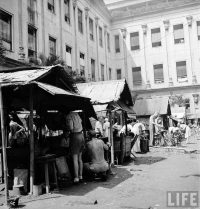By 5:30 we had breakfast, and fifteen minutes later we were in the lobby of the apartment, surrounded by our bags and bundles.
After an hour, when we saw no movement of any kind, we marched back to our apartment, and our luggage seemed to increase in weight with every step.
At 10:30 the doorbell rang; two sloppily dressed soldiers, a Japanese civilian, and our landlord stood at the door. The apartment was again searched, but this time with less bluster and drama, and the same routine questions were asked. Again we were told to wait outside while they went next door.
While we waited, we heard the young mother crying bitterly and pleading with the Japanese to allow her husband to stay. Her baby screamed lustily, but its cries did not drown out the shouting Japanese. In a quiet voice the landlord cautioned the wife to cease her pleadings, and he urged the husband to get his bags.
Single file, we descended the stairs for the last time. Out in the warm sunshine we quietly climbed into the large truck that stood outside the apartment house. When all the other tenants had been rounded up, the truck moved off in the direction of Rizal Stadium.
Feeling like Marie Antoinette on the way to the guillotine, I glanced back to take a last look at my home. From the first to the eighth floor, servants, tenants of neutral countries, and the landlord’s family were leaning out of windows, doorways, balconies to wave to us. The Filipinos who stood on either side of the streets gazed at us sorrowfully.
In a few short blocks we were at Rizal Stadium, where we had watched baseball, softball, and other sports during happier days.
We jumped out of the trucks and placed our belongings in a neat mound before we joined a long line of other Allied nationals who were waiting to show their passports or residence taxes to a group of Japanese officers and civilians.
Sophie, of course, with her home in the provinces, had neither, but after considerable palaver with the Japanese military she was permitted to pass on.
I was next. When the Japanese officer saw my passport, which showed that I was born in Hungary and a naturalized American, he broke into excited Japanese and went into a conversational huddle with the Japanese civilian sitting beside him.
What was up? I waited anxiously while Catesy fidgeted nervously.
Then, in perfect English, the uniformed Japanese said, “You are not American! You can stay out!”
Terrified, I edged closer to Catesy and my friends, and I declared most firmly that I was an American. If I had dared, I would have told him that I was safer with my fellow Americans.
His annoyed expression showed that he thought me a fool and not worth bothering about, and to my great relief he waved me aside impatiently.
As the stadium became more crowded with people, several Japanese civilians divided us into groups of five.
Since Belle and Toinette had joined us, and there were six in our party, we persuaded the Jap to allow us all to go in one car, Including the Japanese driver, who drove like a maniac, there were seven in the car. We were wedged in so tightly with our bags, bundles and bulging pillowcases that we supported each other on the dangerous curves.
“That guy must have been a cab driver in Tokyo!” remarked Catesy as we narrowly missed the curb.
My front view was completely obscured by bundles on my lap, but occasionally I would get a quick glimpse from the side.
The Rising Sun flag was everywhere—on public buildings, trucks, and the tanks which lumbered past us.
We passed the Estado Mayor, former home of the 31st Infantry, and later the Hospital Annex, but it was gone. It had been leveled to the ground.
Tired and unarmed Filipino soldiers marched dejectedly between Japanese soldiers.
No one spoke, not even when our lives were threatened on the dangerous and crowded corners.
In a short time we saw the high tower of a large and gloomy-looking gray stone building, and we saw other large buildings nearby. It was the Santo Tomas University! Was this to be our destination?
On either side of the wide gates leading to the university, Filipino men, women, and children watched us solemnly. Their expressions were sad, and one could see that they were deeply moved.
When Japanese sentries opened the wide iron gates, we passed through. We were inside our prison!
